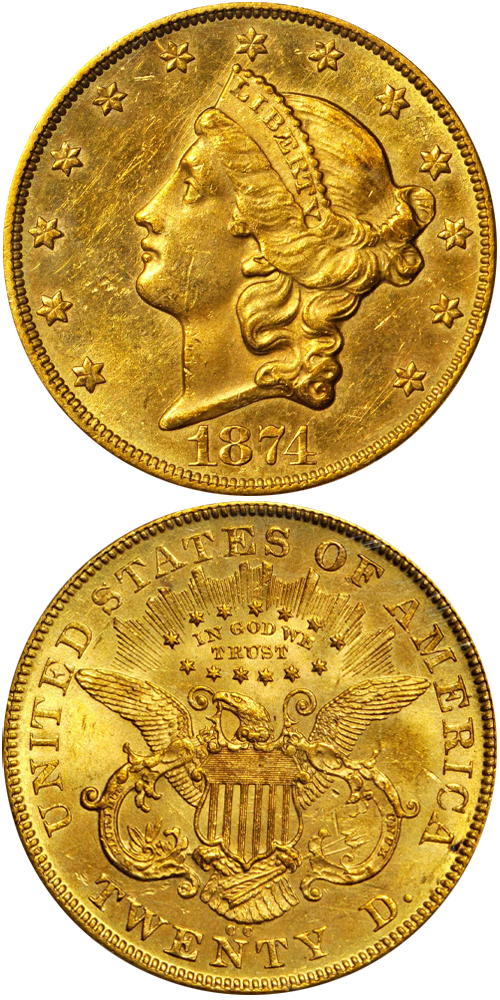1874-CC Liberty Head Double Eagle
Jeff Ambio: We are aware of only a single obverse die for the 1874-CC Liberty double eagle. The date logotype is large with the digits fairly even and the 1 close to the base of Liberty's portrait. At least two reverse dies are known, although the 2001 book Gold Coins of the Carson City Mint by Douglas Winter and James L. Halperin lists only one.
Rusty Goe: The Treasury had already started its drive to store vast quantities of $20 gold pieces in its vaults in 1873. Elite eastern financiers had begun to pile double eagles high on their banks' shelves as well. In 1874, the Carson Mint in its fifth year in business would, in a paltry way, experience what it was like to handle larger quantities of the nation's standard-bearer coin.
By the end of December, the Carson Mint's coining department had delivered nearly 45,000 more double eagles than had come off of the single press in the first four years combined. The Carson Appeal savored every minute of the action, not just in the making of $20 gold pieces, but in the increased outputs of half eagles and eagles as well, not to mention the staggering number of trade dollars being turned out.
James Crawford replaced Frank Hetrich as superintendent at the end of summer. Business shifted into overdrive. Under Hetrich's watch, Coiner Doane had delivered 56,825 $20 gold pieces. In the second half of the year, the Crawford-led team narrowly topped that number, with its total of 58,260 of the large, shiny double eagles. In total, 115,085 were produced.
From such a large mintage figure, one would think that more survivors of the 1874-CC double eagle would exist. So far, however, it appears as if the estimate for extant specimens is set at about two percent of the original output. There are a surprisingly low number of Mint State examples, with just a handful of those worthy of the premium quality designation.
Q. David Bowers: Rusty Goe estimates 2,000 to 2,500 1874-CC double eagles exist in total, of which 18 to 30 are Mint State. These figures are more generous than mine, and for Mint State I suggest a population of about 10 pieces.
VF and EF are the grades usually seen, although AU pieces come on the market often enough that the specialist will have no problem finding one. The AU and Mint State coins are mostly repatriations. Somewhat analogous to the popularity of Charlotte and Dahlonega gold coins of the $1 to $5 denominations, there is a special following for Carson City gold coins, and many who desire such pieces might not even look at a double eagle from another mint.
I reiterate that the lack of numismatic interest in mintmarked twenties marked most such pieces for melting in the 1930s. An interesting example is provided by Lot 14 in the auction by J.C. Morgenthau & Co. (Wayte Raymond and James Macallister) of the Walter P. Innes, Jr. Collection in July 1937: "1874 CC Fine." This coin realized $33, or below the $35/ounce melt-down value at the time! Presumably, the consignor received even less! The great interest in collecting double eagles by mintmark varieties was in its infancy and would not blossom until the 1940s and 1950s.
The example to the left was sold by Stack's Bowers Galleries in the March 2018 Baltimore Auction, where it realized $78,000.






